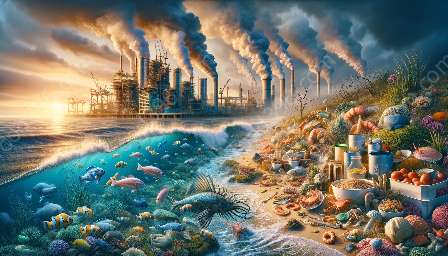Climate change is having profound implications on global seafood contamination and pollution, leading to significant environmental and health concerns. As the planet undergoes rapid environmental shifts, the effects on marine ecosystems are becoming increasingly evident. This has a direct impact on the safety and quality of seafood, posing risks for both marine life and human consumers.
Understanding Seafood Contamination and Pollution
In order to fully comprehend the impacts of climate change on seafood contamination, it is essential to understand the dynamics of seafood contamination and pollution itself. Seafood contamination refers to the presence of harmful substances such as heavy metals, toxins, and pollutants in marine organisms, which can occur through various pathways, including water pollution, air deposition, and bioaccumulation.
Climate change exacerbates these existing issues by influencing ocean temperatures, acidity, and circulation patterns. Rising sea temperatures can intensify the spread of pathogens and algal blooms, which can contaminate seafood and pose serious health risks to consumers. Additionally, changes in precipitation patterns and river flows can contribute to the introduction of pollutants and contaminants into marine environments, further impacting the safety and quality of seafood.
The Intersection of Seafood Science and Environmental Concerns
Seafood science plays a crucial role in assessing the impacts of climate change on seafood contamination and pollution. Researchers and scientists in this field are tasked with monitoring the health of marine ecosystems, analyzing changes in fish and shellfish populations, and investigating the presence of contaminants in seafood. Through a combination of field studies, laboratory analyses, and data modeling, seafood scientists can provide valuable insights into the complex interactions between climate change and seafood safety.
At the same time, environmental concerns surrounding seafood contamination and pollution have prompted regulatory agencies and policymakers to develop stringent standards and guidelines for the monitoring and control of seafood safety. This includes measures to mitigate pollution sources, establish sustainable fishing practices, and enhance public awareness about the risks associated with consuming contaminated seafood.
The Risks to Human Health and Marine Ecosystems
The impacts of climate change on seafood contamination pose significant risks to both human health and marine ecosystems. Elevated levels of contaminants in seafood can lead to various health issues, including neurological disorders, cardiovascular diseases, and reproductive problems. Vulnerable populations such as pregnant women, infants, and the elderly are particularly at risk due to their heightened susceptibility to the adverse effects of contaminants.
Furthermore, the ecological consequences of seafood contamination are far-reaching, affecting marine biodiversity, food chains, and ecosystem stability. As marine organisms become exposed to increasing levels of pollutants, their populations may decline, leading to imbalances in the marine food web and compromising the overall health of ocean ecosystems.
Adapting to Climate-Induced Changes
Addressing the impacts of climate change on seafood contamination requires proactive measures aimed at adaptation and resilience. This includes leveraging advanced monitoring technologies to track changes in oceanic conditions, implementing sustainable aquaculture practices to minimize contamination risks, and promoting the diversification of seafood sources to reduce reliance on vulnerable ecosystems.
Furthermore, collaborative efforts between scientific communities, seafood industry stakeholders, and governmental organizations are essential for developing comprehensive strategies to mitigate the risks associated with seafood contamination and pollution in the face of climate change.
Conclusion
Climate change continues to exert far-reaching effects on seafood contamination and pollution, presenting multifaceted challenges for the preservation of marine ecosystems and the protection of public health. By recognizing the intricate interplay between climate change, seafood science, and environmental concerns, society can work towards sustainable solutions to safeguard the future of seafood production and consumption in a rapidly changing world.

